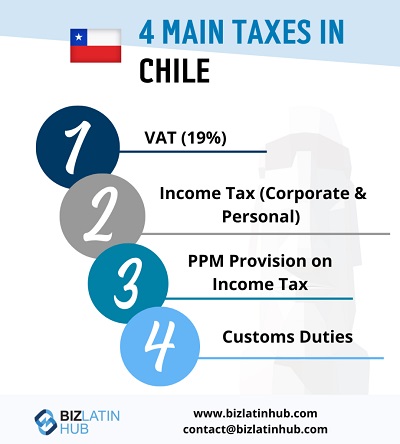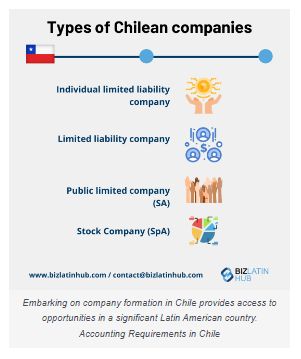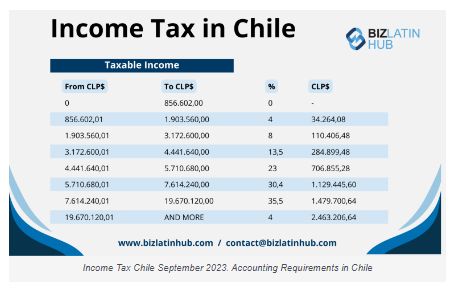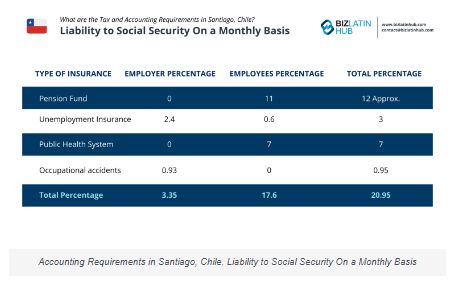When a company decides to move their business into a new market
and to open up a new office in a new country, one of the first
things to be considered is the country’s tax system. This
article gives further insights on taxation and accounting
requirements in Chile.
Before moving a business into a new market, it is important that
a company fully evaluates these matters to determine if the
company’s existing accounting, finance, and tax professionals
can manage this or if necessary to engage a local professional accounting
services provider for the business. Hence, when making the
decision to move into a new market, the new country’s tax
regime is of high importance and must be taken into
consideration.

Taxation
& Accounting Requirements in Chile
Taxpayers in Chile are companies, individuals and other legal
entities, affecting the income of all corporations and individuals.
Hence, all individuals and companies are subject to an income tax
on their monthly or annual income. Foreign individuals pay income
tax only on their Chilean sourced income during their first three
years in the country, this period can be extended to three more
years, although after that they are also subject to income tax on
their worldwide income.
The tax authority in Chile is the Internal Revenue Service (SII – Servicio de
Impuestos Internos) which is a public organization and depends
on government administration in Santiago, Chile. From the time the
taxpayer filed the return, the tax authority (SII) has an official
three-year time limit in order to review, amend or rectify any tax
return previously filed.
Accounting standards in
Chile
Chile’s accounting
standards are:
Basic financial
statements must include:
- A statement of financial position
- A statement of comprehensive income
- A statement of cash flows
- A statement of changes in shareholder equity
- Notes to the financial statement.
Additionally:
- The presentation currency is the Chilean Peso.
- Concerning accounting laws, all laws registered are defined by
the Codigo
Tributario. - The tax year starts on the 1st of January and ends
on 31st of December in the same year. - Local accounting for companies in a foreign currency (USD, EUR)
is allowed but needs to be specifically authorized and cannot be
changed for (2) years.

Chilean Taxation Number
When carrying out business in Chile a company has to be
registered and obtain a Chilean taxation number and tax ID (RUT).When
a company’s deals with the country’s taxation, this number
is required in order to deal with the national tax authorities.
Moreover, every individual, including foreign individuals in Chile
must obtain a Chilean National Tax ID and a password for the
Chilean IRS website (www.sii.cl)
in order to be able to file their annual tax returns.
Consumer Price Index (IPC)
In the following table, you can find the values of UTM (Monthly
Tax Unit) and UTA (Yearly Tax Unit) for the months of 2023,
expressed in Chilean pesos (in the first and second columns,
respectively). The remaining columns show the IPC (Consumer Price
Index) for each month of that year and the monthly percentage
variation, accumulated up to the date, and annual variation.

Income Tax
– Accounting Requirements Chile
The Chilean income tax system affects business income, salaries,
other personal income, as well as income which was obtained by
non-residents. Income-tax is structured in different categories and
they have to be applied accordingly. Categories are First Category,
Second Category, Complimentary Global and Additional taxes.
Generally, in Chile two main tax rates have to be taken into
account, the first is the tax rate for companies or corporate tax
(first category
tax), where income is received by exercising commercial,
industrial, agricultural and other activities and the second
important tax is the tax on employment income (second
category tax).
Chile’s
First Category Tax (Corporation Tax)
All companies which are resident and domiciled in Chile are
subject to “First Category Tax” (FCT) and are taxed on
their worldwide income. All company’s non-resident in Chile are
taxed on their income received in Chile only. The first category
tax is calculated on the basis of the company’s taxable profits
generated within a tax year. Additionally, all companies based and
operating in Chile are required by law to make monthly advance
payments (PPM), through monthly declaration (F29), and there is
also a non-obligatory voluntary (PPM) for companies who wish to
keep an additional provision for the yearly income tax, and in the
case of an overpayment the Internal Revenue Service makes a refund
of the exceeded amount.
The first thing the taxpayer must know is the tax regime to
which it is subject, which determines its tax obligations, such as
the filing of certain tax returns.
The taxpayer can consult his current Tax Regime or that of
previous periods in his personal MiSII section by selecting the
option Personal and Tax Data and then Taxpayer Characteristics.
Chile’s Second Category Tax (Personal Income Tax)
The Chilean income tax law is described in detail in the Decree Law 824 of 1974,
known as the Income Tax Law is administered by the Chilean Internal
Revenue Service’s (Servicio de Impuestos Internos). In general,
it can be said that every person working and living in Chile,
resident or nonresident is subject to Chilean income tax. All
entities resident or domiciled in Chile are taxed on their
worldwide income. Non-residents are only taxed on their income
earned in Chile.
Therefore, the Second Category Tax is concerned with all
personal sources of income including salaries, bonuses, gratuities
and other forms of remuneration. The highest progressive rate for
this tax is 40% and all taxes have to be paid on a monthly basis in
accordance with a monthly timetable issued by the Chilean Tax Authority
(Servicio de Impuestos Internos). This tax is deducted from the
gross salary by the employer and subsequently paid over to the
Chilean Internal Revenue Service. Depending on the type of income 6
different income tax rates apply. Furthermore, the income tax is
based on the following two factors:
- The taxpayer’s place of residence
- Source of the income
The taxpayer’s place of residence: In order
to be considered to be a resident, a person has to have lived more
than 6 months within a calendar year in Chile. For non-residents
and non-domiciled the tax rate is 15% if the activities are
technical or professional services if they are not a tax rate of
35% has to be paid on their Chilean-source income alone.
Source of the income: Income is to be
considered Chilean source income, when the income is received while
performing activities within the country, as of services for
businesses and income from property, dividends, royalty and other
income. Therefore, the income is sourced where the service is
provided.
Current Tax Rate in
Chile for 2023
The following table shows the current tax
rate in Chile for September 2023, this table changes on a
monthly basis and income has to be taxed accordingly.

Value-Added Tax (Impuesto al Valor Agregado – IVA) –
Accounting Requirements Chile
Value-added tax in Chile has to be paid on all sales and imports
of goods and services. Furthermore, additional taxes and import
duties have to be applied when importing certain goods such as
beverages, jewels, and others. Currently, the VAT rate is set at
19% of the price of the goods or services. With regards to
importing, the taxable basis is the customs value, CIF Value, which has to be
considered and already includes customs duties. VAT returns must be
filed on a monthly basis.
Regarding exports of goods and services, the VAT rate is zero,
not considering how the product will be exported. Additionally, as
of January 1, 2023 all services (with few exceptions) are taxed
with VAT.
According to the Law, the following services will not pay
VAT:
- Passenger Transportation (Urban, interurban, interprovincial
and rural). - Education (Schools, Kindergartens, Universities, among
others). - Outpatient health services (medical and dental consultations,
psychologists, psychiatrists, kinesiologists, imaging, among
others). - Other services that were already exempted in the VAT Law, such
as: - Tickets to shows (*)
- Lease of unfurnished real estate
- Others (Sales and Services Tax Law Art.12 and 13).
- All other exemptions contained in the VAT Law and other legal
texts remain in force.
Penalties & Fines
When tax returns are not filed within the timetable established
by the tax authorities or if they contain errors, fines have to be
paid. The amount of the fine depends on the length of the debt due
and the channel of payment the taxpayer uses to pay the debt.
Usually, the amount is three times the tax, then the tax initially
due, but when using the SII online payment the percentage of the
fine is lower than when paying at one of the offices directly.
When paying these penalties, the Internal Revenue Service (SII)
has a policy known as (Condonacion) in which if you pay the total
amount of the debt, is up to a discount of 70% of legal fees
(Interest and fines), this a benefit of the new tax reform.
The tax system in Chile is very flexible if everything is always
properly informed, even when in debt; it supports businesses to
keep on growing, through payment facilities.
Other
Employee Contributions – Pension & Health
In general, it can be said that social security deductions make
up to 20% off the monthly salary, these contributions include
payments into the pension fund, the health insurance, unemployment
insurance and the Chilean association of security.
Health Contributions
Chile’s health system has existed since the 1950’s, it
was originally introduced as a national health care system and was
one of the first in Latin America. The relevant agency for the
health care system is the Fondo Nacional de Salud (FONASA). Today
workers can choose between the private health system Instituciones de Salud
Previsional (ISAPRE) and the public health system Fonasa, the
monthly mandatory payment is 7% of monthly income for FONASA and
about 9.2% for the private system ISAPRE.
Pension Fund
Contributions
Regarding the pension system, all employees can choose between
six different private pension companies and furthermore are able to
choose between different types of funds. The monthly mandatory
payment on their income is approximately 12%. Any individual can
pay a higher percentage if they decide to. If workers are
self-employed they can decide whether to contribute or not and
which amount they want to contribute on a monthly basis.

(AFP): Pension Fund Contributions
(SIS): Disability and Survival Insurance
1) Employer payment.
2) SIS doesn’t apply for pensioner dependent
employee.
3) This rate includes SIS, which corresponds to the
employee.
Liability to Social Security On a Monthly Basis:

Common Questions when understanding accounting and taxation in
Chile
Based on our extensive experience these are the common questions
and doubts from our clients when looking to understand accounting
and taxation in Chile.
corporate tax rate in Chile?
In general terms, the rate is 25%. That would be the headline.
Notwithstanding the above, it should be noted that it is constantly
being modified to reduce all the consequences of the pandemic back
to 25%.
taxed in Chile?
In Chile, as far as business is concerned, taxation is based on
income actually received.
Internal Revenue Service (IRS) Called in Chile?
The IRS in Chile is called el Servicio de Impuestos Internos or
in English, The Tax Administration Service, and is responsible for
implementing the fiscal and customs legislation in Chile.
accounting standard in Chile?
Chilean accounting standards require companies to prepare their
financial statements in Spanish and according to Normas
Internacionales de información financiera (NIIF) or in
English IFRS and Principios de la Contabilidad Generalmente
Aceptados. (PCGA)
equivalent in Chile?
The equivalent of a CPA in Chile is aColegio de Contadores
AGcertified public accountant (Contador Publico
Certificado—CPC).
in IFRS?
In general terms, and as far as all BLH clients in Chile are
concerned, according to the current regulations, since 2009 all
companies must follow the IFRS standards.
Biz Latin Hub can help you with Accounting Requirements
Chile
If you want to start a company in Chile, it is advisable that
you have the support of a qualified account and tax specialist from
the start. A well thought out business plan will not be able to
evolve if your business does not remain in good standing with the
local Chilean authorities.
Biz Latin Hub can assist you with all accounting, taxation and
financial matters. Our locally specialist team have a comprehensive
understanding of the local laws and complications in the Chilean
business environment and are well equipped to work with foreign
companies looking to conduct commercial activity in the region.
To learn more about the Chilean economy, the business
opportunities to form a company in Chile, and how you might take
advantage of these politicalshifts, please contact us
today. Or read about our team and
expert authors.
Interested in hiring local staff in
Latin America? See how we can support through either a local
company formation or through a tailored PEO solution.

The content of this article is intended to provide a general
guide to the subject matter. Specialist advice should be sought
about your specific circumstances.

